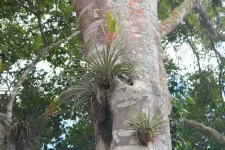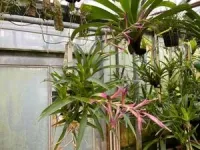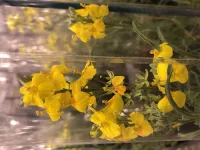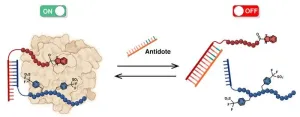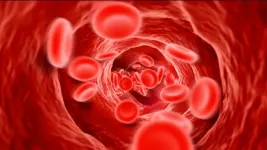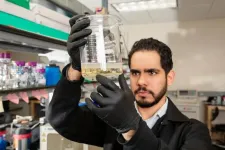(Press-News.org) Researchers at the University of Vienna, along with collaborators from France, Germany, Switzerland and the USA, have achieved a major breakthrough in understanding how genetic drivers influence the evolution of a specific photosynthesis mechanism in Tillandsia (air plants). This sheds light on the complex actions that cause plant adaptation and ecological diversity. The results of their study are now published in Plant Cell.
Some plant species have evolved a water-saving trait called Crassulacean Acid Metabolism (CAM). CAM plants like most Tillandsia species – the most species-rich genus in the pineapple family (Bromeliaceae) – optimise their water use efficiency: While other plants normally open their stomata (tiny pores in their leaves) during the day to absorb carbon dioxide for photosynthesis, CAM plants do this at night and stash CO2 away for later use, helping them survive with less water. This trait evolved independently several times across the plant kingdom. However, the evolution of the complex genetic basis of CAM has remained elusive, making it a focus of research in evolutionary biology.
Gene Regulation is Key
In this study, the research team focused on a Tillandsia species pair exhibiting divergent forms of photosynthetis– CAM vs. C3 – meaning that the C3-species lacks the specialized adaptation to arid conditions. By using advanced techniques to study the plants' genetics and biochemistry – e.g. analyses of gene arrangements, molecular and gene family evolution, temporal differential gene expression and metabolites – they discovered that changes in gene regulation are mainly responsible for genomic mechanisms driving CAM evolution in Tillandsia.
Clara Groot Crego, Department of Botany and Biodiversity Research at University of Vienna and lead author of the study, explains: "Our findings reveal that while large-scale changes have influenced Tillandsia's genomes like other plants, the adjustment of how photosynthesis works mainly happens through how genes are regulated – not by changing the sequences that code for proteins." Key insights from the study, funded by the Austrian Science Fund (FWF) and the University of Vienna, include the identification of CAM-related gene families undergoing accelerated expansion in CAM species. This highlights the critical role of gene family evolution in generating novel variation that drives CAM evolution.
Into New Niches by Repeated Evolution
"CAM repeatedly evolved in different Tillandsia species and has accelerated their ability to colonize new ecological niches, serving as a key driver of the rampant speciation observed within this group," says Ovidiu Paun, Department of Botany and Biodiversity Research at University of Vienna and principal investigator of the study. "Our research highlights the potential importance of genetic innovation, beyond mere base pair changes, in driving ecological diversification", Paun adds.
Thibault Leroy, principal investigator from INRAE Toulouse, France, emphasizes that this study has implications beyond basic science. "Understanding how CAM evolved can help develop strategies to make crops more resilient to water shortages and cope with climate change."
The research will be extended across more species of this and other plant groups in the framework of a newly collaborative project jointly funded by the Austrian Science Fund (FWF) and the French National Agency for Research (ANR).
END
Unlocking the genetic mysteries behind plant adaptation: New insights into the evolution of a water-saving trait in the pineapple family (bromeliaceae)
Adaptation of the photosynthetic mechanism in air plants (Tillandsia) occurs through gene duplication
2024-04-30
ELSE PRESS RELEASES FROM THIS DATE:
Childcare pick-up: a 1-hour window to build healthier eating habits
2024-04-30
Millions of working parents know the routine: bustle the kids off to childcare in the morning, work all day, then fight the daily traffic jams to get the kids back home. Something to drink, maybe a snack to munch, can help ease the commute.
Understandably, few parents take the time to think about the nutrients or calories involved, but experts at Cincinnati Children’s decided to take a closer look. Their eyebrow-raising findings were published April 27, 2024, in the journal Children’s Health Care.
The researchers took a fresh look at older data contained in daily food journals kept by more than 300 families of children who attended 30 childcare ...
MD Anderson and Replay announce FDA clearance of IND application for first-in-class PRAME-targeted TCR NK cell therapy for hematological malignancies
2024-04-30
HOUSTON, SAN DIEGO and LONDON ― The University of Texas MD Anderson Cancer Center and Replay today announced that the Food & Drug Administration (FDA) has issued a ‘safe to proceed’ for the Investigational New Drug (IND) application for PRAME TCR/IL-15 NK (SY-307), an engineered T cell receptor natural killer (TCR NK) cell therapy for relapsed/refractory myeloid malignancies. MD Anderson is the IND sponsor.
PRAME TCR/IL-15 NK (SY-307) is being developed by Syena, an oncology-focused product company launched by Replay and MD Anderson based on the scientific discoveries of Katy ...
Discovery of mechanism plants use to change seed oil could impact industrial, food oils
2024-04-30
PULLMAN, Wash. -- Researchers have discovered a new mechanism of oil biosynthesis and found a way to genetically engineer a type of test plant to more efficiently produce different kinds of seed oil that it otherwise wouldn't make.
While the engineering is proof-of-concept, this discovery could lead to improved production of valuable oils used in food and by a range of industries. The study, led by Washington State University researchers, was published in the journal Nature Communications.
“Scientists have been working on producing ...
A new anticoagulant with no risk of bleeding
2024-04-30
Anticoagulant treatments are crucial for managing many conditions, such as heart disease, stroke and venous thrombosis. Current options, however, carry an inherent risk of serious bleeding due to trauma or unforeseen events. A team from the University of Geneva (UNIGE) and the University of Sydney has developed a new anticoagulant, designed to have an on-demand reversible activity, with a fast-acting ‘‘antidote’’. This approach could revolutionise the use of anticoagulants in surgery or other applications. The mechanism of activation and deactivation of the active principle ...
Genetic adaptations have impacted the blood compositions of two populations from Papua New Guinea
2024-04-30
Papua New Guinea (PNG) has a wide range of environments, each presenting unique challenges to human survival. Highlanders and lowlanders of PNG are striking examples of populations facing distinct environmental stress. Whereas the highlanders encounter low oxygen availability due to altitude, the lowlanders are exposed to specific pathogens that are absent in the highlands, such as malaria. Despite these strong environmental pressures, the specific adaptations of these populations have remained overlooked. A new study published in Nature Communications on Tuesday, 30 April 2024 sheds light on the genetic adaptations of Papua New Guineans in response to their unique environmental ...
Abrupt permafrost thaw intensifies warming effects on soil CO2 emission
2024-04-30
According to a recent study published in Nature Geoscience, scientists have found that soil carbon dioxide (CO2) emissions are more sensitive to climate warming in permafrost-collapsed areas than in non-collapsed areas.
This study, based on field warming experiments combined with laboratory incubation of soils from a large-scale sampling, provides new insights about permafrost carbon–climate feedback in the context of future climate warming.
Warmer temperatures have led to rapid permafrost thawing in high-latitude and -altitude permafrost regions. Abrupt permafrost thaw, ...
Scientists discover over 100 new genomic regions linked to blood pressure
2024-04-30
National Institutes of Health researchers and collaborators have discovered over 100 new regions of the human genome, also known as genomic loci, that appear to influence a person’s blood pressure. Results of the study also point to several specific genomic loci that may be relevant to iron metabolism and a type of cellular receptor known as adrenergic receptors.
The study, published in Nature Genetics, is one of the largest such genomic studies of blood pressure to date, including data from over 1 ...
Researchers identify over 2,000 genetic signals linked to blood pressure in study of over one million people
2024-04-30
The Queen Mary-led study reveals the most detailed picture yet of genetic contributors to blood pressure. The findings lead to improved polygenic risk scores, which will better predict blood pressure and risk for hypertension.
Researchers led by Queen Mary University of London and supported by the National Institute for Health and Care Research (NIHR) have discovered over a hundred new regions of the human genome, also known as genomic loci, that appear to influence a person’s blood pressure. In total, over 2,000 independent genetic signals for blood pressure are now reported, demonstrating that blood pressure is a highly complex trait influenced by thousands ...
Scientists find cancer-like features in atherosclerosis, spurring opportunity for new treatment approaches
2024-04-30
Researchers have discovered that the smooth muscle cells that line the arteries of people with atherosclerosis can change into new cell types and develop traits similar to cancer that worsen the disease. Atherosclerosis is characterized by a narrowing of arterial walls and can increase risk of coronary artery disease, stroke, peripheral artery disease, or kidney disorders. The findings, supported by the National Institutes of Health (NIH), could pave the way for the use of anti-cancer drugs to counteract the tumor-like mechanisms ...
A virus could help save billions of gallons of wastewater produced by fracking
2024-04-30
EL PASO, Texas (April 30, 2024) – An estimated 168 billion gallons of wastewater — or produced water — is generated annually by the Permian Basin fracking industry, according to a 2022 report by the Texas Produced Water Consortium. The major waste stream has proved both difficult and costly to treat because of the chemical complexity of the water.
In a new study published in the journal Water, researchers at The University of Texas at El Paso have identified a novel means of treating the wastewater generated by oil and gas production: bacteriophages.
Ramón Antonio Sánchez, a doctoral candidate within UTEP’s chemistry ...
LAST 30 PRESS RELEASES:
Duke-NUS scientists identify more effective way to detect poultry viruses in live markets
Low-intensity treadmill exercise preconditioning mitigates post-stroke injury in mouse models
How moss helped solve a grave-robbing mystery
How much sleep do teens get? Six-seven hours.
Patients regain weight rapidly after stopping weight loss drugs – but still keep off a quarter of weight lost
GLP-1 diabetes drugs linked to reduced risk of addiction and substance-related death
Councils face industry legal threats for campaigns warning against wood burning stoves
GLP-1 medications get at the heart of addiction: study
Global trauma study highlights shared learning as interest in whole blood resurges
Almost a third of Gen Z men agree a wife should obey her husband
Trapping light on thermal photodetectors shatters speed records
New review highlights the future of tubular solid oxide fuel cells for clean energy systems
Pig farm ammonia pollution may indirectly accelerate climate warming, new study finds
Modified biochar helps compost retain nitrogen and build richer soil organic matter
First gene regulation clinical trials for epilepsy show promising results
Life-changing drug identified for children with rare epilepsy
Husker researchers collaborate to explore fear of spiders
Mayo Clinic researchers discover hidden brain map that may improve epilepsy care
NYCST announces Round 2 Awards for space technology projects
How the Dobbs decision and abortion restrictions changed where medical students apply to residency programs
Microwave frying can help lower oil content for healthier French fries
In MS, wearable sensors may help identify people at risk of worsening disability
Study: Football associated with nearly one in five brain injuries in youth sports
Machine-learning immune-system analysis study may hold clues to personalized medicine
A promising potential therapeutic strategy for Rett syndrome
How time changes impact public sentiment in the U.S.
Analysis of charred food in pot reveals that prehistoric Europeans had surprisingly complex cuisines
As a whole, LGB+ workers in the NHS do not experience pay gaps compared to their heterosexual colleagues
How cocaine rewires the brain to drive relapse
Mosquito monitoring through sound - implications for AI species recognition
[Press-News.org] Unlocking the genetic mysteries behind plant adaptation: New insights into the evolution of a water-saving trait in the pineapple family (bromeliaceae)Adaptation of the photosynthetic mechanism in air plants (Tillandsia) occurs through gene duplication
